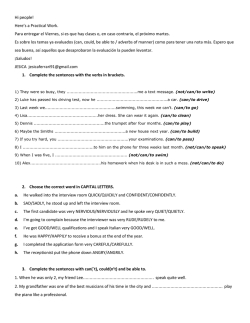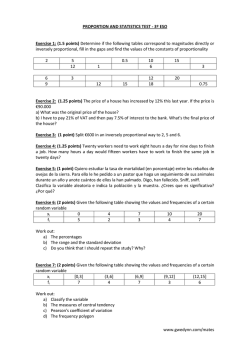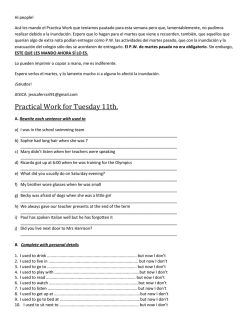
English Newsletter - Mosque Foundation
mada II 1431 Issue 36 W W W. M O S Q U E F O U N D AT I O N . O R G March 2016 – Jumada I - Jumada II 1437 Issue 101 Message From The Imam HOW TO REVIVE YOUR PRAYER Part Five Sh. Ahmed Arafat Improve Your Mental Preparation What is the part that, if missed, will turn your prayer into a series of mumbled words and machine-like movements? Definitely, it is Munajah (intimate conversation with Allah ) that I covered in the first part of this series on reviving our prayers. For this Munajah to be present and effective, a Muslim must be mentally ready for Salah. Just remember the last important interview you had. You must have prepared yourself well by conducting basic interview research: the dress code, direction to the office, learning about the institution on line …etc. Of course, Allah is beyond all comparison. So, if you really think of Salah as a great blessing to communicate with Allah , you should be gratefully prepared. In his al-Fawaid, Imam Ibn al-Qayyim observes: “There are two times when a servant stands before Allah: in Salah and on the Day of Judgment. Whoever takes care of the first standing, the second will be easy for him; whoever neglects the first standing, the second will be hard for him.” Here are quick tips that will help us improve our mental preparation. 1- Start with an Undivided Mind. After preparing some food for the family members, one of my relatives said “Let us pray first and then eat without any interruptions!” She did not want any Salah thoughts while eating. She wanted to enjoy eating with a clear mind. In response, I said: “Let us eat first and then pray without any interruptions!” To be less distracted during Salah and to strengthen our focus on Salah, the prophet taught us to start our prayer with an undivided mind. narrated that the prophet said: “When the dinIbn Umar ner is being served, and the time for a prayer becomes due, start with the dinner and do not be hasty” (Bukhari & Muslim). That is why, whenever he feels hungry and the food is ready, Ibn Umar used to start with eating even if he can hear the Imam’s recitation. We should also note that if a person is little hungry and knows that hunger will not be a distraction, he or she should start with the prayer. ‘Amr ibn Umayyah narrated that he saw the prophet using a knife to cut a piece of meat from a cooked sheep shoulder. As the prayer was called, the prophet put down the meat and the knife and went for offering the prayer” (Bukhari & Muslim). taught us not to start Salah while we Similarly, the prophet feel that we need to use the bathroom. Instead of praying while you resist the urge to urinate or defecate, you should relieve yourself first. ‘Aiesha said that she heard the prophet saying: “No ritual prayer is to be offered when the food is being served or when a person resists “al-akhbathayn” the urge to urinate or defecate.” 2- Dress Well Wearing clean and neat clothes indicates that Salah is a special meeting and that you are taking it seriously. This is not a prerequisite for the prayer; however, dressing well is a great continue on page 2 PERMIT 107 BRIDGEVIEW, IL 60455 PAID PRESORT STD U.S. POSTAGE continue from page 1 HOW TO REVIVE YOUR PRAYER, Part Five Improve Your Mental Preparation MF BOARD OF DIRECTORS 1. Oussama Jammal 2. Hussein Ata 3. Abdallah M. Shuaibi 4. Ahmed Kamni 5. Habes Abdallah 6. Banan J. Said 7. Kalid Y. Baste 8. Aisheh Said 9. Kamal Eldeirawi 10. Jafar Ahmad 11. Jamal Said 12. Jehad J. Matariyeh 13. Karen Danielson 14. Mohamed Aduib 15. Montaha Salem 16. Muin Abusharara 17. Safaa Zarzour EDITORIAL BOARD Oussama Jammal Sh. Jamal Said Sh. Ahmed Arafat Tareq Abu-Ammer Aisheh Said Mohamed Chehade Banan Said Abdel Baset Hamayel M ar c h 2 0 1 6 Vol. 06, Issue 101 Copyright © 2015 by The Mosque Foundation. All Rights Reserved. Reproduction without permission is strictly prohibited. Community Pulse is published monthly in the United States by The Mosque Foundation. Editorial and executive offices are located at 7360 W. 93rd Street, Bridgeview, IL 60455. Subscription rates in U.S. and possessions: 1 year (12 issues) FREE. Send address changes to: The Mosque Foundation, 7360 W. 93rd Street. Bridgeview, IL 60455. Printed in U.S.A. 2 mental preparation for Salah. The Quran commands: “O Children of Adam, wear your beautiful apparel at every time and place of prayer: eat and drink: But waste not by excess, for Allah loves not the wasters” (7:31). In accordance with this verse, Tamim al-Dari bought an expensive garment for Salah. 3- Smell Nice and Subtle Smelling well could influence your brain activity. Many scents refresh the mind, create a sense of alertness, boost attentiveness, produce a sense of optimism, fight mental fatigue, improve focus and stimulate clear thinking. It is interesting to note that smelling nice was part of traits of the prophet’s personality. Anas ibn Malik narrated: “I have never smelt any musk or amber better than the fragrance of the prophet ” (Reported by Muslim). Umm Salamah also narrated that the prophet used to wear musk and apply it to the face and hands whenever he performs the wudu. The Sahabah followed this Sunnah very closely. Ibn Mas’ud was known for his nice smell, and before his prayers he liked two things: “good fragrance and neat clothes.” Similarly, people used to figure out if Ibn Abbas walked through a street on account of his good smell! It is equally important to avoid wearing anything with an overpowering smell since that could be a distraction in Salah. Obviously, one must stay away from anything that produces bad smell. In a clearcut direction, the prophet instructed us: “Let those who ate onions or garlic keep away from our mosque since the angels are harmed by whatever harms humans” (Bukhari & Muslim). 4- Avoid the Causes of the Hardness of the Heart Imam Ibn al-Qayyim observed: “Four things, when excessively done, will lead to the hardness of the heart: eating, sleep- March 2016 – Jumada I - Jumada II 1437 ing, talking and mingling with others.” Have you ever prayed after you overate or overslept? Have you ever prayed after having a long “unnecessary” conversation with somebody? No doubt, this was not the best Salah. Let us discuss the negative effects of overeating, oversleeping and excessive, unnecessary conversations before Salah. A) For good focus on Salah, do not eat till you are 100% full. The prophet suggested that you may be 66% full! Al-Miqdad ibn Ma’d Yakrib said: I heard the prophet saying: “There is no vessel which the son of Adam can fill that is more evil than his stomach, for it is enough for him to take a few bites in order to straighten his back. Yet if he is overcome by appetite, then he may fill it with a third of food, a third of drink, and a third of breath.” B) Besides the medical problems of oversleeping, those who oversleep may feel more tired. This feeling is not a good preparation for Salah. C) Try to avoid long conversations before Salah as much as you can. If necessary before Salah, limit your conversations to good causes or important matters. The Quran reads: “In most of their secret talks there is no good except for one who exhorts [others] to a deed of charity or justice or conciliation between people. Whoever does this, seeking the good pleasure of Allah, We shall soon give a reward of the highest (value)” (4:114). Generally speaking, the prophet taught us: “Whoever believes in Allah and the Last Day, let him or her say good or be silent.” 5- Have few moments of contemplation before the first Takbirah. Some people may start their Salah after a long conversation with others or even after laughing or shouting, and suddenly they find themselves praying! Always have at least few moments of silence to prepare your heart and mind. To bring in Khushu’ before you start your prayer, have few seconds to think about one of the following: A) Remember a sin you committed and a blessing Allah bestowed on you. This will generate a sense of haya’ and humility that makes you look down humbly. March 2016 – Jumada I - Jumada II 1437 B) Imagine that this prayer might be the last one for you to offer. In this way, you will try your best to perfect it. C) Imagine the glory and greatness of Allah’s creation (e.g. we have more than 150 billion galaxies!) and how small you are. In spite of how small we look, Allah honored us; therefore, feel proud that you are one of His servants. D) Think about how short this life is and how eternal the afterlife is. Just 100 years ago, no one alive now was there, and in 100 years, no one who is alive now will be there. This is how short this life is. 6- Do not start your prayer with a lie! One of the most effective ways to maintain your focus in Salah is to recognize the meaning of Allahu Akbar through which we start our prayer. Allahu Akbar literally means “God is greater.” Greater than what? Greater than anything you can imagine. Therefore, when you start your prayer with Allahu Akbar, you are basically saying Allah is greater than my money, my school, my work …etc. That is why, Imam al-Ghazali warned: “Make sure that you do not start your prayer with a lie!” It is also interesting to notice that the sentence Allahu Akbar signals most of the movements during the Salah. In other words, “Allah is Greater” serves as a constant reminder that it is shameful to think of anything other than Allah while you are in His presence. In this way, the frequently repeated Allahu Akbar can help us regain our focus if we lost it. or supplications” (Reported by Muslim). Practically speaking, prepare your Du’aas and pray earnestly and sincerely. 7- Prepare your Quranic recitations. When you pray on time, you have a better chance for concentration. Think of the last time you offered a prayer few minutes before the next prayer was due? Think of the last time you had to combine two prayers without a valid excuse? So, for better focus during Salah, allow enough time. Of course, the best option, in this regard, is join the Jama’ah or congregation prayer in the masjid. Instead of reciting the same exact short Surahs in every prayer, try to memorize a variety of Surahs, short Quranic passages or even single verses. If you can only memorize one verse, here are some suggestions for inspiring verses: (2:186), (2:281), (3:8), (4:135), (16:277), (16:281), (17:23), (24:30), (29:69), (39:53), (41:30), (41:34), (49:10), (49:12), (49:13), and (50:16). 9- Allow Enough Time. 8- Prepare personal Du’aas. 10- Observe the Sunnah Dhikr during the day. When you include personal prayers in your Salah for yourself, your family and your Ummah, your Salah will be transformed from being a dead format into a real personal relation. The best part in Salah for personal prayers is during Sujud (prostration). The prophet taught us: “Nothing brings the servant closer to Allah more than Sujud; so, offer frequent prayers The more you focus on Allah outside Salah, the easier you can focus on Him during Salah. Observing the many Dhikr the prophet taught us throughout the day will help a Muslim develop an undivided heart that is set on Allah is willing to surrender to Him completely. Wallahu A’lam. 3 SO, WHAT IS THE PURPOSE OF INTERFAITH DIALOGUE ANYWAYS? By Karen Danielson I am often asked and unfortunately also criticized for dedicating so much time and effort to Interfaith Dialogue (IFD) and activity so it makes me happy to present to you some statements I have written in the past about IFD and why I think it is essential for every American Muslim community to dedicate time, resources, and training to this kind of outreach. First, two of the most common misconceptions about IFD are “if we are not getting converts or if we are compromising our faith practices and principles, why do we continue in IFD?” To this I say one must understand that IFD objectives do not include proselytization (preaching or converting) but strives to maintain the integrity of our faith. In fact, it is among IF partners that Islam in America is privy to more authenticity in the eye of the American Public and it is distinguished as a valid as well as a vital faith that contributes to the social justice and betterment of the American society. The imperatives of IFD seek to transform communities at the grassroots level and institutionally because engagement and dialogue reduces tension, cultivates respect and appreciation among community members all the while it creates a shared voice around commonalities, develops an environment for building trust, and encourages change for the betterment of society. It is the most foundational element and precursor to civic engagement because it gives Islam and Muslims validity. When IFD is not instituted religious intolerance, fear, hate, bigotry, and isolation ensues as well as misunderstandings, stereotypes, and ignorance. As Muslims, we are neither allotted the opportunity to model the beautiful attributes of Islam and convey the shared desire to live and participate in a truly pluralistic society without IFD. Below are some excepts I wrote for the various segments of the MAS 2015 Interfaith Symposium at the 14th MAS-ICNA convention that was held here in Chicago this past December that I hope you will agree include the merits of IFD. Regarding Interfaith Dialogue in GeneralGlobalization and the Media have centered a secular-materialistic world view that reacts to and sensationalizes differences rather than embracing diversity and affirming a co-existence among all peoples and faiths. Political tensions and nationalistic agendas have brought violence, poverty and significant human rights violations affecting more and more people every day in greater ways than ever before. People of faith communities must fend off the dichotomous approach of political ideologies – the “us vs. them” – in order to create an environment where justice and safety is afforded to all. Faith and truer faith practices transcend the disturbing phenomenon of religious intolerance, discrimination, and violence. It is necessary for all faiths to communicate and establish joint practices which honor co-existence and cooperation – “…to come to know one another.” (Qur’an 49:13) Regarding Faith Communities for a Better WorldThe Qur’an reminds us in the following verse –“To each (religious community) there is a goal to which it faces; then strive all together towards all that is good. Whereso ever ye are, Allah will bring you together. For Allah hath power over all things.” (Qur’an, Verse 2:148) – that cooperative and engaging relationships must be developed especially between people of various faiths to ensure human rights, address poverty and income inequality, counter racism, hate and violence, and even combat climate change and global warming. However, this can not be achieved if we stay behind our fences, isolated in our communities. Due to the rise of religious intolerance (Islamophobia), hate, and racism more lives are being taken and the safety of more and more people than ever before in our cities, towns, and neighborhoods is being threatened. Mass shootings, police brutality, and a media bent on painting an entire people evil either because of race or faith is indicative of a society that is in danger of losing the principles of its own civil rights. Faith communities must unite to take back what is wholesome and pure and bring back peace and harmony. Regarding Interfaith Engagement for Social JusticeOur world is suffering. Violence, religious intolerance, hate, and racism are the critical issues suffocating our society. Faith communities must collaborate to alleviate the ill effects of poverty, income inequality, mass incarcerations, immigration injustice, the refugee crisis, corporate control of the media, global warming and even the food we eat. Working together requires mutual understanding and respect -all afforded through IFD. Grassroots dialogue inspires bigger change. In fact, lasting social justice starts with civic engagement. Civic engagement starts with community engagement. Community engagement starts with a share voice. Shared voices start with discussions and dialogue. Discussions and dialogue begin with people of compassion, love, and patience. We find that it is in faith communities where this is most cultivated among peoples. Therefore, real and sustainable change for the better begins with IFD. 4 March 2016 – Jumada I - Jumada II 1437 March 2016 – Jumada I - Jumada II 1437 أسماء الفائزين في 2016 �إ���ابا� م��� ا��ا�� لم�سس� ال�ام� ل�ا Winners of The Mosque Foundation Board Elections 2016 ااسم NAME ABDALLAH SHUAIBI JAFAR AHMAD KAREN DANILESON AHMAD KAMNI JEHAD MATARIYEH KAMAL ELDEIRAWI # عبد ه الشعيبي 01 �ع�� ا��د 02 ��������� �ا�ي 03 ا��د ���ي 04 ����� ���� 05 ������ الد��ا 06 President : �الفائز بال�ئاس OUSSAMA A. JAMMAL ��������� ال Annual report presentation Elections President report Meet the candidates Members discussing annual report Registration 01 5 MI PRIMER DÍA E LA MEZQUITA Asalamalaykum hermanos y hermanas, mi nombre es Jafeth yo soy un Musulmán convertido. Quiero dar gracias por darme la oportunidad para expresar alguna de mis experiencias en el islam. Algo que me impacto cuando yo empecé a ir a la mezquita era que las mujeres se ponían hijabs y que los hombres estaban separados. Yo no pensé nada malo o asumí cosas, mejor pregunte, entonces aprendí que era por respeto. Al principio se me hizo extraño que los hombres estaban separados de las mujeres, ya que había crecido toda mi vida en la iglesia Cristiana conviviendo con ellas. Fue después que empecé a leer el Corán y a aprender de otros hermanos que entendí porque se hace esto. El propósito de esta separación es que ambos los hombres y las mujeres se enfoquen y se sumerjan totalmente a Allah durante la oración, y para que no sean distraídos por ver a personas del sexo opuesto. Esta división entre ambos sexos también ayuda a que los dos mantengan su mente y corazón puros mientras adoran a Dios. Esto me pareció bien porque entonces todos se podían enfocar más en lo que importa, Allah. Lo que se me hizo más difícil fue aprender cómo orar porque era una manera nueva de orar para mí, pero con mucha paciencia aprendí. Sentí que esta manera era mejor porque ensena más respeto a Allah (Alabado y exaltado Es). Lo que me impacto al ver a la gente postrándose fue que había tantos tipos de hombres humillándose ante Dios. Se me hizo hermosa la idea de que otras personas en el mundo estuvieran rindiendo oración y alabanzas al mismo tiempo, haciendo el acto de oración aún más íntimo con Dios. Cuando oí la llamada a la oración estaba confundido porque era la primera vez que había oído algo así, y aparte no sabía lo que decían. Fue entonces que un hermano me explico que el llamado era una recitación que se hace antes de orar. Me pareció una idea excelente, ya que así uno sabría cuando tiene que orar. El llamado a la oración también ayuda a que tu mente y cuerpo se relajen y se preparen para orar a Allah, algo que no había experimentado en la iglesia Cristiana. Después de pensar acerca de las cinco oraciones que los musulmanes hacen decidí que era una buena práctica, ya que te ayuda a estar en más contacto con nuestro creador, Allah. Al estar en contacto constante con Allah te ayuda y motiva a ser una mejor persona y Musulmán, ya que uno sabe que se encontr- ara con Dios pronto y tendrá que dar cuentas de lo que hizo mientras esperaba por la próxima oración. Esto te hace pensar dos veces antes de hacer algo que es considerado un pecado, y te ayuda rectificar tus acciones e intenciones porque siempre estás pensando en la manera que te quieres presentar a el Creador cuando te encuentres de nuevo con El. Unas de las cosas que me sorprendieron fue que a diferencia de la iglesia, no te presionaban a dar algo que no tenías. Estaba acostumbrado a ver gente dando dinero porque eran presionados a hacerlo, no porque les nacía de corazón. Al ver que en la mezquita no hacían eso me di cuenta que de esa manera la gente donaba dinero porque les nacía, y lo daban con sinceridad y amor para agradar a Allah, no a ningún ser humano. Siento como que muchos pasan por las mismas experiencias que yo pase ese día cuando fui a la mezquita por primera vez. A causa de la experiencia que pase aprendí que tenemos que ayudar y guiar a la gente que va a la mezquita por primera vez, ya que ellos no saben lo que está pasando a sus alrededores porque es un idioma y ambiente nuevo. Tenemos que recordar en la manera que nos sentimos esa primera vez que entramos a una mezquita, y guiar a las personas en la manera que nosotros quisiéramos que nos hubieran guiado cuando primero aprendimos del Islam. Les agradezco por la oportunidad de compartir mis experiencias cuando primero entre al Islam. Paz y Bendiciones sean con ustedes. -Jafeth Garcia 6 March 2016 – Jumada I - Jumada II 1437
© Copyright 2026



